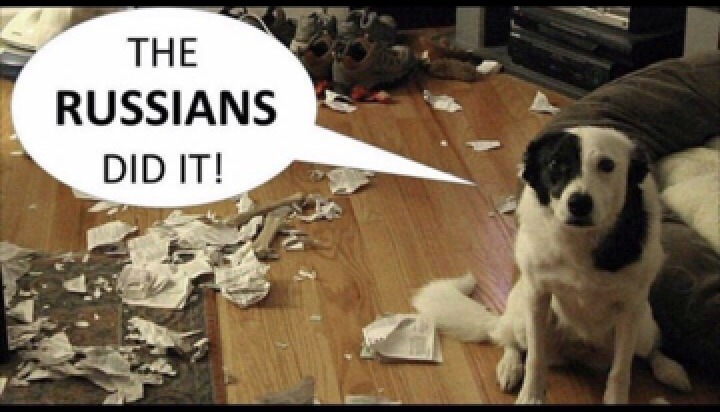Guest Post by

We’re shut out now. There hasn’t been an op-ed in The New York Times or Washington Post editorial pages arguing that the United States is at least equally to blame for this new Cold War crisis. They simply will not accept those articles…So this is the problem. In a democracy we fight through discourse. If you can’t get to the mainstream media and make the argument, then there’s no way of slowing the drift toward catastrophe.
– Stephen F. Cohen, Professor Emeritus of Russian studies at Princeton University and New York University
Stephen Cohen just recorded an incredibly trenchant interview regarding the extreme dangers of the recent explosion in Russia hysteria with Brian Lehrer on WNYC.
Before we get to it, I want to highlight the following paragraphs published in Politico earlier today. While the article itself was embarrassingly biased toward standard U.S. government talking points, some valuable history can be found amongst all the noise. Such as the following:
Related was Hillary Clinton’s enthusiasm for NATO’s further expansion into Eastern Europe. That process was based on the well-founded idea that Eastern Europe needed—indeed, was asking for—protection from Russia aggression. But Russia’s military establishment treated it as a slow-rolling invasion of their sphere of influence.
This reaction, too, had its roots under Bill Clinton. An expanded NATO would help ensure democracy, prosperity and stability across Europe, he believed. Moscow took a sharply different view. After one 1994 summit at which Yeltsin gave Bill Clinton his blessing to the addition of new NATO members—including Poland and Hungary, both former Soviet satellites—a communist newspaper fumed about “the capitulation of Russian policy before NATO and the U.S.” One of Yeltsin’s main political opponents said he had allowed “his friend Bill [to] kick him in the rear.” He compared the agreement to the treatment of Germany at Versailles after World War I—a recurring theme among Russian officials since the Cold War’s end.
Some of Bill Clinton’s top advisers correctly predicted that NATO expansion would produce a backlash in Moscow, and would create a handy narrative for would-be nationalists to posture against the West. Clinton’s secretary of defense, William Perry, told POLITICO this summer that he considered resigning over the issue out of concern for its effect on U.S.-Russia relations. But Clinton pressed ahead, kicking off a process that added a dozen new members over the next 20 years, from the Baltic countries of Latvia, Lithuania and Estonia through Eastern Europe (the Czech Republic and Romania) and into the former Yugoslavia—all places where Russia had once enjoyed uncontested influence.
As Obama kept the NATO train rolling, his secretary of state was fully on board. “There can be no question that NATO will continue to keep its doors open to new members,” Clinton said in February 2010.
Now without further ado, here’s perhaps the most important interview you’ll hear all month. Listen and share with everyone you know.
For related articles, see:
Did The Washington Post Once Again Promote ‘Fake News’ With Regard to Russian Election Interference?
Video of the Day – Congressman Calls Tucker Carlson a Russian Agent on Prime Time Television
Liberty Blitzkrieg Included on Washington Post Highlighted Hit List of “Russian Propaganda” Websites
If you enjoyed this post, and want to contribute to genuine, independent media, consider visiting our Support Page.
In Liberty,
Michael Krieger



Cohen was the darling of the left in the 80’s. That he, a famous Ivy League professor, can’t get anything published in major newspapers is illustrative of the bizzaro world we’re in. Good thing he’s going public.
Post the mp3 or don’t bother. These shitty embedded players are useless garbage.
The upside is that the NY Times is having to significantly shrink their operations. Losing 8 floors, executives losing their corner offices, etc..
It appears that people just aren’t interested in reading fake news, communist propaganda, and baseless conspiracy theories about imaginary Russian hackers.
http://www.zerohedge.com/news/2016-12-16/new-york-time-will-vacate-8-floors-its-headquarters-generate-significant-rental-reve
WNYC has the shittiest site I’ve ever seen. They literally have no fucking clue what they are doing.
MP3 –
RSS for the show – http://www.wnyc.org/feeds/shows/bl
It was the one on 12/14/2016 12:04 PM
amazing the naive approach to the actions of nato when history tells a far different story as to how the russians would respond, we are talking about centuries. long before the marxist. long before america.
What a gong show:
http://www.zerohedge.com/news/2016-12-16/faithless-electors-will-not-receive-intelligence-briefing-npr-says
Lazy, inept, incompetent, smallest man in the room with phony birth certificate puppet for Soros all of a sudden after eight years of golf, vacations,prayer rugs, and Regie Love wants Russian propaganda push.Obama will always be known for his EMPTY CHAIR .Obama will always spew tripe none believes
Neocon Fail. Still trying to get high on the pipe dream of PNAC. Their dream of American world hegemony peaked in the late ’90s (Kona Gold), faded in the Iraq debacle (Mexican Dirt) and imploded when they placed the child-man kenyan in the white house (Oregano).
Heh, watched a couple minutes of the Adam Schiff, Carlson video, had enough at Schiff pointing out it was the “assessment” of “whoever” there was “kremlin” involvement in the election. NEWSFLASH! government “whoever” assessment’s are veiwed lower than whale shit in large segments of the population now.
After a consultation with wiki for Congresscritter “Adam Schiff”, he has a long list of stirring up the pot and supporting questionable causes to say the least,wonder if he has some sort of agenda ?